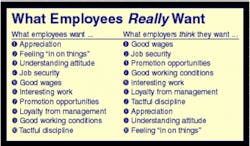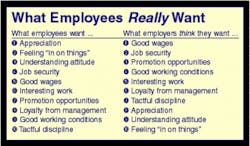Staffing—Your greatest asset, Your greatest challenge(Part 2)
In Part 1 of this series — see the March 2004 issue of Woman Dentist Journal — we discussed finding the right people through newspaper ads that work, tapping into good sources for possible job candidates, employment testing, checking references, and smart interviewing. In the conclusion of this two-part series on staffing, Dianne Glasscoe, RDH, will share how to create the right environment for that new employee based on what team members really want in a job ...
One of the most challenging aspects of practice for many clinicians is staff management. Why do some offices have contented, long-term team members, while others seem to have a permanent ad in the newspaper continually attempting to fill open positions? This two-part series examines the things that affect team satisfaction and longevity.
After you have made your hiring decision, ask yourself two very important questions:
- What do I have to offer this person besides money? Is there potential for growth, achievement, and continued learning?
- How do I keep my employees highly motivated, productive, and eager to come to work each day?
Creating an atmosphere that is conducive to continued growth and learning is a challenge for any employer who wants happy, motivated team members. Further, team members leave for a variety of reasons, but the number one predictor of happiness is whether or not the employee feels appreciated. Money is important, but it is not the best way to show your appreciation to a team member.
Sometimes doctors are their own worst enemies. A negative attitude about the team will negatively affect the working relationship. Some doctors view their team members as liabilities, and are more concerned about what the team can do for the doctor and the practice than about them as human beings.
Perfectionism is another issue. Dentists are notorious perfectionists! Often these same doctors are intolerant of anything that they deem less than perfect. They continually find fault with their team's performance and are unwilling to look at their own imperfections. The fact is, there are no perfect team members or perfect doctors. Everyone makes mistakes. To create a stress-free work environment, we must learn to overlook imperfections in others. Team members do not like feeling "under the microscope" day in and day out.
What is your attitude toward your team? Do you view it as a vital support system that permits you to operate your practice effectively and smoothly? Do you see your team members as the eyes, ears, mouth, hands, and feet of the practice, while you are the soul and the brain? Are your team members valuable components in your practice machinery without which you could not function?
Indeed, the relationship we have with team members is similar to that of a parent and child. Children thrive on recognition and praise, and so do team members. If we understand this concept, then why don't we act on it more? Those old perfectionist attitudes we hold as professionals often prevent us from praising our team as often as we should. Never underestimate the power of praise!
Honestly evaluating your general attitude toward your team as a whole can be the first step in solving turnover problems. Team members are quite sensitive to your attitude about them as people and as employees. If your attitude is negative, you will have a difficult time expressing appreciation, both verbally and nonverbally. And generally, when people do not feel appreciated, they tend to seek positions where they feel appreciated. If you appreciate your team, remember to express it verbally, financially, and emotionally.
What is your attitude toward your work? Do you wake up each day with a sense of excitement and anticipation of the challenges that await you? Do you love dentistry? Are you interested in the latest technological advances, and do you try to stay abreast of the tide of change? Are you proud to be a member of the dental profession? Are you enthusiastic about helping your patients?
Or do you dread going in to the office? Are you just biding time until your children graduate from college so you can retire? Are you often grumpy and ill-tempered? Does the thought of trying anything new intimidate you? Would you rather be anywhere than at work?
If your work attitude has deteriorated, maybe it's time to look inside yourself for the causes. Too many financial pressures, team discord and turnover, unrealistic expectations — these and other things can destroy your passion.
Often, passion can be reignited by learning new things. That's why it is so important to be a continual learner. Always include team members in new learning endeavors, because this makes them feel like they are an integral part of the practice.
Doctors who have a poor work attitude cannot hide the fact from their team members. A poor attitude reveals itself in a multitude of actions that are detrimental to team morale and the practice in general.
What team members want
As business owners, we often believe that the prime determinant of employee satisfaction is money. However, various surveys have shown a different perception. What employers think is most important is very different from what employees value most about their jobs.
In the following survey, employees and employers were asked to rank these job-related traits in order of importance:
- Good wages
- Promotion opportunities
- Tactful discipline
- Loyalty from management
- Appreciation
- Feeling "in on things"
- Interesting work
- Understanding attitude
- Good working conditions
- Job security
The results
In prosperous countries like the United States, studies have routinely shown that the things that make people happy are family satisfaction, friendships, and relationships with other people — but not money. (Lane R. The loss of happiness in market democracies. Yale U. Press, 2000.)
Seven things that team members want:
· Pleasant working relationships. Let's face it — when team members like one another and get along well, a happy atmosphere prevails. It's pleasant and even fun to work where employees and doctor enjoy good camaraderie. It gives the office a "family feeling," and it is difficult for employees to leave the "family." That's why it is so important to hire friendly, congenial people. Personality is a plus!
As head of the "family," the doctor sets the tone for the entire office. One of my first positions in a dental office was with a doctor who knew how to promote that family feeling among his team. He endeared himself to us as fellow professionals. We worked as a team, and he was our coach and chief cheerleader. It was not unusual for him to tell patients that he had the best team anywhere.
When doctors assume dictatorial leadership styles and view their team members as "hired help," this style of leadership does not promote good doctor/team relations. The "me vs. them" relationship that results usually creates stress among employees and ultimately leads to high turnover.
As important as it is for team members to get along well with the doctor, it is equally important that they get along well with each other. One of the biggest threats to harmonious relationships among team members is gossip. One team member's proclivity to gossip can poison the entire office atmosphere.
The key to curbing gossip is to make it clear to team members that gossip will not be tolerated. When clashes occur, those involved can settle the problem themselves without drawing other team members into the disagreement. Again, the doctor needs to take a leadership role. If gossip and cliques are a problem in your office, address this issue one-on-one with the team member(s) involved. If you have a team member who is prone to gossip, your practice would probably be better off without this person.
· Good benefits. In most communities, hiring and retaining top-quality employees means you must compete with private-industry companies that offer competitive wages and typically an array of benefits. To compete more favorably with these companies, consider offering a benefits package that includes such things as a retirement plan, hospital insurance (especially for single employees), continuing-education allowance, uniforms, paid vacations, and bonus incentives.
Many dental professionals have told me that they will work for less pay in order to get benefits. Retirement plans are especially nice to retain employees for the long-term.
· Good pay. Good benefits and a good atmosphere will not mean much, however, if you do not offer competitive wages. I've heard it said that "Doctors who pay peanuts will get monkeys for employees." The doctor pays just enough that the team member will not quit, and the team member works just enough not to get fired!
If you wish to hire and retain good, sharp people, you need to pay above-average wages. Because wages vary widely across the country, try to find out what colleagues in your area pay their team members. Doctors who pay above-average wages usually do not have a turnover problem, although good pay is no guarantee of team dedication.
· Appreciation. Most doctors believe their team members are best motivated by money, when actually many employees crave appreciation more than anything else. One comment I hear repeatedly from team members is, "The doctor doesn't appreciate me."
You can show appreciation to your team members in many ways other than giving raises or bonuses. For instance, verbally express your genuine appreciation; occasionally take team members out to eat; use phrases such as, "Would you please ..." and "Thank you"; respect their time by staying on schedule and finishing on time. There is no price tag for human dignity. Generally, team members will give 110 percent in practices where they feel genuinely appreciated.
· The integrity factor. Team members tend to admire doctors whom they perceive as upright and moral. They feel secure when they work for a "good" person. Here are a few of the things team members have told me when expressing why they admire their employer:
- "The doctor helps poor people by taking care of their dental needs at a reduced fee or at no charge."
- "The doctor is more interested in his patients' needs than his own."
- "The doctor respects her patients."
Integrity comes from the heart and is impossible to hide. Team members form perceptions of a doctor's character by how he or she deals with patients and other team members. When a doctor dwells excessively on production, team members may negatively perceive that doctor as a "money person." The push to "sell" a certain number of crowns per day/week, etc., is a huge turn-off to most auxiliary team members. Some team members have confided to me in interviews that they would not refer their friends to their employer because "the doctor is only after patients' money."
That's not to say that you shouldn't stress the importance of productivity to your team members. You must realize, however, that they need to see the other side too. When team members see you occasionally going the extra mile by doing a little "charity" dentistry or by giving someone in need a fee break, their admiration of you increases. It's also a great practice-builder.
· Comfortable scheduling. Stress is another factor that can determine whether a good employee stays with a practice. When there is good communication between the clinical and business areas of the practice, the daily schedule can be controlled to reduce stress.
Properly train front-desk personnel in scheduling techniques and the verbal skills required to prevent the schedule from controlling the office. Teach them to avoid phrases such as, "Mrs. Jones, when would you like to come in?" Instead, empower the scheduler to retain control by offering Mrs. Jones specific appointment options. For example, "Dr. Wonderful can see you on Monday at 10 a.m. or Tuesday at 2 p.m. Which would be better for you?"
Communicate your expectations to the scheduling coordinator. Don't allow your schedule to become overbooked day after day. If you or your hygienist run behind schedule consistently, examine your scheduling techniques. Make sure that the person who is responsible for scheduling is clear on how much time to allocate for each appointment. For example, if you need 90 minutes to do a crown preparation, scheduling anything less than that will cause stress and frustration.
A time and motion study done by an objective, outside source can be valuable in determining the time needed per procedure. In addition, it is important to build in some emergency time each day. By doing so, patients who have scheduled appointments won't feel cheated by having "their" time usurped by an emergency patient. Likewise, team members won't have to deal with the stress of assuaging preappointed patients who have to wait due to emergency cases.
· Preparation for absences. In small dental offices with only one chairside assistant, one front-desk assistant, and one hygienist, an unpleasant situation can develop when someone is sick. How prepared the practice is to handle these common situations can significantly influence employees' attitudes toward their employer.
Employees in some offices feel they are not allowed to be absent for any reason. That puts tremendous pressure on team members when they are ill, a family member is ill, or some other personal problem arises that would necessitate being absent from work. Having an extra team member who is cross-trained can relieve a lot of pressure on the whole team.
Don't wait until the need arises to find yourself scrambling for help. Plan for absences, because they will happen.
Final word
Good employees do not appear by magic, but through good hiring practices. Take some time to screen candidates carefully to choose the best person for the open position in your office. If you choose a quality person, the chances are better for success and longevity. After you have hired a new team member, create an office environment that is conducive to growth and learning. Be the practice's leader; do not allow cliques and gossip to take root and grow. Problems will not go away by ignoring them, so handle them as they arise, one-on-one with those involved. Finally, understand that money alone is not the best measure of team happiness. Genuine appreciation, respect, and support are the things team members desire. Small gestures of appreciation reap large rewards.
Dianne Glasscoe, RDH
Ms. Glasscoe is a national author, speaker, and consultant to dental professionals. Her company, Professional Dental Management, is based in Frederick, Md. Visit her Web site at www.professionaldental mgmt.com, send email to [email protected], or call (301) 874-5240.


